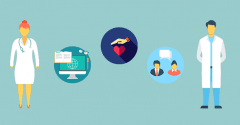Employers and Universities: Work with us?

What skills do I need for a career in health?
Are you thinking about beginning a career in healthcare? Or maybe you’re wondering what job should do and looking into the different options.
Skills for health jobs differ depending on the role you want to specialise in. That said, there are some skills which will help you whatever area of healthcare you’d like to go into.
This article looks at these core skills for health, as well as helping you identify whether you have them – and how to develop them if you don’t.
'Considering a healthcare career? Check out the skills you need to thrive'
A list of skills for health
People skills
It might seem obvious, but many healthcare jobs require you to work directly with the public. Doctors, consultants, nurses, midwives, dentists, counsellors and psychiatrists, and many other healthcare workers talk to patients and their family members every day.
This doesn’t just mean diagnosing and treating health conditions. Patients will often be worried or even distressed. Good people skills keep patients calm and reassured, and enable you to help them understand what they can expect.
Do I have people skills?
- Do friends and family come to you when they have a problem?
- Do you connect with strangers?
- Are you tactful and sensitive but always honest?
Communication

Communication with patients and colleagues
is a really important skills for health jobs
Similar to people skills, good communication is important for all healthcare workers. Patients need to understand what’s wrong with them, what it means for their health, and what any treatment may involve. You need to do this clearly but sensitively, while avoiding jargon.
Good communication between you and your colleagues is also vital. That might mean dealing with people in very different roles at varying levels, including staff with less (or no) medical training. Everybody has to work together seamlessly to ensure a good service for patients.
Do I have communication skills?
- Got a way with words?
- Do you do well in essay-based subjects?
- Are you a whiz when it comes to presentations?
- Are you good at explaining complicated ideas in simple language?
- Do you have a part-time job which involves talking to the public?
Listening
The ability to listen is part of good communication skills. But it’s so important to health workers, especially GPs, nurses, consultants and pharmacists, that we’ve given it its own category.
Only patients know how they feel, which means listening carefully ensures they get the right diagnosis and treatment. Listening carefully limits the chances or conditions being misdiagnosed, which in some cases can be very dangerous.
Do I have good listening skills?
- Do you let people have their say and think about the meaning behind their words before responding? Or does your mind wander as soon as someone else opens their mouth?
- If you can’t wait to have your turn in a conversation, remember the wise words of the ancient Greek philosopher Zeno: “We have two ears and one mouth”.
Compassion

A bit of sympathy goes a long way when
dealing with worried or distressed patients
Compassion, or a caring attitude, is more of an attribute than a skill, but it’s vital for any health worker dealing with public. It’s especially important for doctors, nurses, and counsellors and psychiatrists, who often deal with people in pain or distress, or who are fearful about their health.
Am I compassionate?
- If you’re impatient, or don’t have much time for other people and their concerns (!),you might want to work on your compassion.
- Try thinking about things from the other person’s point of views, and you might find it easier to understand their feelings.
IT skills
Good computer skills are important in most jobs nowadays, and healthcare is no exception. IT systems and email are used to communicate with colleagues and keep records. This ensures patients receive a seamless service when dealing with different parts of the health service.
Do I have good IT skills?
- Comfortable with computers? Savvy with a smartphone? The chances are your IT skills are tip top.
Problem-solving
Anyone working in a medical role tackles problems every day. This ranges from using symptoms to diagnose illnesses and conditions to coming up with a course of treatment which fits a patient’s lifestyle.
Do I have problem-solving skills?
Maths is all about solving problems, but subjects like history, English, psychology and philosophy also require you to think logically when presenting arguments and engaging with texts.
Do I have problem-solving skills?
- Problem-solving is crucial to any creative process, which means you use it in design and technology, art and music as well.
- Do you enjoy craft or a hands-on hobby like rocket-building, woodwork or electronics?
Science and technology

A knack for IT is important, but skills in
technology and science are also a boon
It doesn’t take a rocket scientist to figure out that a good grasp of biology is useful for anyone wanting to work in a medical profession. Even if you don’t need a degree, it will stand you in good stead.
Some roles require you work with pretty advanced technology. As well as machines like MRI scanner, surgeons and even some dentists use technology to aid their work.
Do I have science and technology skills?
- If you’re studying maths, biology, chemistry and/or physics then you’re already building up your scientific knowledge.
- If you’d like to work in healthcare and haven’t yet chosen your A-levels, think carefully about taking these subjects.
- Find out what specific qualifications you need to do the job you’re interested in pursuing.
How can I learn more?
This article’s just for starters. We have a whole host of detailed articles looking at what qualifications, experience and skills you need for specific jobs in healthcare:
- Career Zone: Medicine & Healthcare
- How to become a nurse
- How to become a midwife
- How to become a mental health nurse
- How to become a counsellor
- Health careers with a difference: Sonographers
- Health careers with a difference: Phlebotomists
- Health careers with a difference: Anaesthetists
- What jobs in psychology can I do?
Image credits
Lead image: Freepik, Popcorns Arts, Vectors Market
Images: Vectors Market
